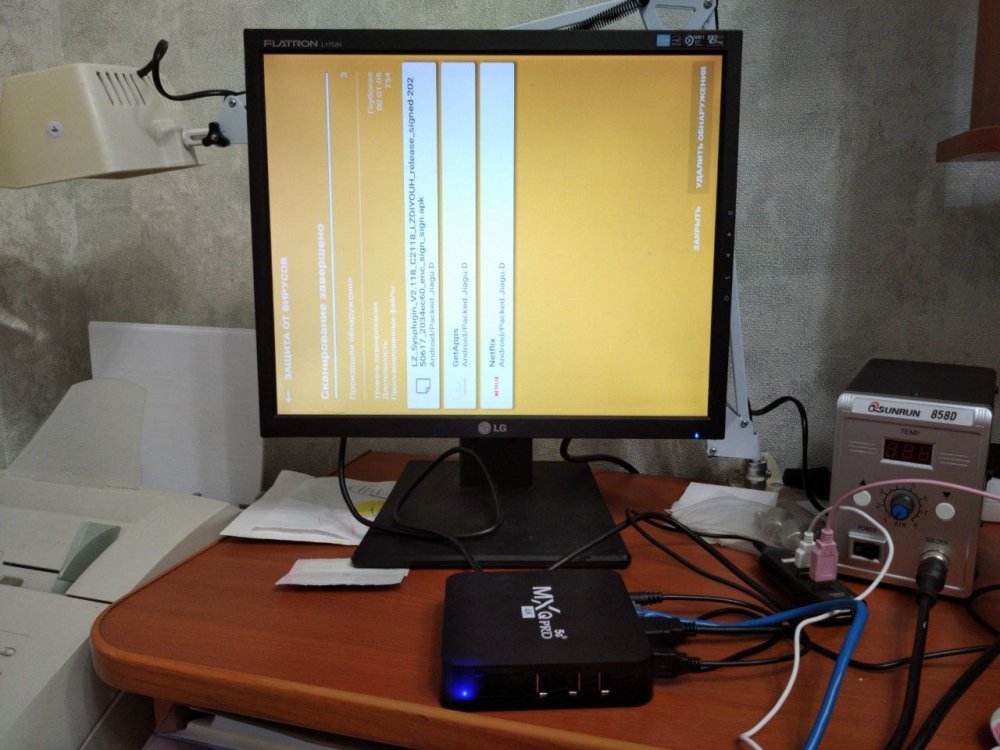All Activity
- Past hour
-
There are three ways to do this. The first simplest is to assemble a binary debian package using the Armbiyan assembly system and then convert it to a rpm package directly in a running OpenSuse OS. The second way is more complicated but it is more correct. You can take patches directly from the build system and apply them to OpenSuse kernel sources in the sequence in which the build system does this while running. Next, build the kernel package using rpmbuild. The third way is the same as the second but use OBS. This will allow you to have your own repository of signed packages and install them using zypper. You can find like-minded people anywhere on our planet, including this place. Hope this helps you.
- Today
-

HC4 PWM Fan Control Not Working - Need Guidance to Contribute a Fix
Georges Holland replied to Adrienne's topic in Beginners
Hey, I think I'm impacted by the same issue. I've replaced the original fan of the HC4 with a Noctua NF-A4x10 5V PWM earlier this year. It was working as expected, but since couple weeks the fan is at 100% speed continuously, which is loud. It sounds like it's a software upgrade that broke the PWM control, but no idea which one. I've done part of the same testing you mentioned but didn't managed to find a fix neither. I'm probably even more beginner than you, so I don't think I can help much unfortunately. How can we get more eyes on this issue? Did you post on Odroid Forum? -
OK, so I installed the latest Debian/Trixie + Cinnamon + vendor kernel available and audio is working. The name of the cards and mixers are different though: speaker-test worked both by specifying the mixer (... -D plughw:CARD=rockchiphdmi0,DEV=0) or through PulseAudio's ALSA emulation after setting the default sink to the rockchiphdmi0 card. The list of audio cards is different in the vendor kernel than what's available OOB with the edge kernel, so I'm not sure if the configuration is comparable. But the audio port/cable combo seems to be fine so there's that..
-
Yes, exactly.
-

Motorcomm YT6801 Ethernet Controller
Xorcist replied to Xorcist's topic in UEFI x86 / qemu x86 / arm64
Oh are you saying that the Tuxedo v1.0.30 package works with the latest 6.12.44 headers? I did not try moving ahead to the latest as I didn't see an option to swap to that kernel in armbian-config (only to go back to 6.12.32). My current kernel is 6.12.41 (default install). I assume I can manually update via: sudo apt-get update && apt upgrade -y and then install the headers afterwards. -
I can try it, just to check that the cable/port combo is ok. I'm not sure how would that help - the reason I'm using the edge kernel is to use the upstream/Linux kernel implementation and the implementation may not be the same as the one provided in the outdated vendor image.
-
tl;dr; You need to fix the driver code similar we do it here https://github.com/armbian/build/tree/main/patch/misc I tried this: https://github.com/albertogviana/YT6801 (but tuxedo v1.0.30 might have this already fixed) https://paste.armbian.com/xeraretaxu.diff I fix the most obvious errors, but don't have time to deal with this code. Some intermediate or old kernels might be missing matched headers. They are present at latest kernel (tested). BTW, it works for me: khadas-mind:Downloads:% sudo dpkg -i tuxedo-yt6801_1.0.30tux4_all.deb Selecting previously unselected package tuxedo-yt6801. (Reading database ... 158138 files and directories currently installed.) Preparing to unpack tuxedo-yt6801_1.0.30tux4_all.deb ... Unpacking tuxedo-yt6801 (1.0.30tux4) ... Setting up tuxedo-yt6801 (1.0.30tux4) ... Loading new tuxedo-yt6801-1.0.30tux4 DKMS files... Building for 6.12.44-current-x86 Building initial module for 6.12.44-current-x86 Done. yt6801.ko: Running module version sanity check. - Original module - No original module exists within this kernel - Installation - Installing to /lib/modules/6.12.44-current-x86/updates/dkms/ depmod... (Re)load module if possible khadas-mind:Downloads:% modinfo yt6801 filename: /lib/modules/6.12.44-current-x86/updates/dkms/yt6801.ko license: GPL license: GPL author: Motorcomm Electronic Tech. Co., Ltd. version: 1.0.30 description: Motorcomm YT6801 Gigabit Ethernet Driver srcversion: 13DED66BAFB05DCB4D65DE6 alias: pci:v00001F0Ad00006801sv*sd*bc*sc*i* depends: name: yt6801 retpoline: Y vermagic: 6.12.44-current-x86 SMP preempt mod_unload modversions parm: debug:FUXI ethernet debug level (0=none,...,16=all) (int)
-
I suggest to confirm first that it works with the vendor image, just in case. If you boot the vendor image you could also gather some info, like aplay -L, etc.
-
.thumb.jpg.20ed26dd68aaee94a94b227bf670a8eb.jpg)
support request: NanoPi-R76S
SuperKali replied to Dantes's topic in Framework and userspace feature requests
@Dantes Board is now supported, i advice you to wait next nightly release for fix some issue on cpufreq driver. If experiencing some issue please report on https://forum.armbian.com/forum/85-rockchip/ -

mxq pro 4k 5g allwinner h313 can't sd card boot
Sergey Lepeshkin replied to Ducdanh Nguyen's topic in Allwinner CPU Boxes
@Ducdanh Nguyen, can you contact seller of your tv box and ask if they can provide firmware (or "firmware update") for it? -
This issue isn't for orangepione, but for nanopineo - which I can't find in the dropdowns anymore. Perhaps it is no longer supported. I'm able to build a working image using this command: ./compile.sh BOARD=nanopineo BRANCH=current RELEASE=noble BUILD_MINIMAL=no BUILD_DESKTOP=no KERNEL_CONFIGURE=no COMPRESS_OUTPUTIMAGE=xz However, if I add the CPU governance variables, such as this: ./compile.sh BOARD=nanopineo BRANCH=current RELEASE=noble BUILD_MINIMAL=no BUILD_DESKTOP=no KERNEL_CONFIGURE=no COMPRESS_OUTPUTIMAGE=xz CPUMIN=81600 CPUMAX=96000 ...the build fails with the following error text: ./compile.sh mike [🚸] This script requires root privileges; Docker is unavailable [ trying to use sudo ] [🌿] Applying cmdline param [ 'PREFER_DOCKER': '(unset)' --> 'no' early ] [🌱] Skip cmdline param [ 'ARMBIAN_RELAUNCHED': already set to 'yes' early ] [🌿] Applying cmdline param [ 'SET_OWNER_TO_UID': '(unset)' --> '1000' early ] [🌱] Skip cmdline param [ 'PREFER_DOCKER': already set to 'no' after config 'config-mike.conf' ] [🌱] Skip cmdline param [ 'ARMBIAN_RELAUNCHED': already set to 'yes' after config 'config-mike.conf' ] [🌱] Skip cmdline param [ 'SET_OWNER_TO_UID': already set to '1000' after config 'config-mike.conf' ] [🌱] Starting single build process [ nanopineo ] [🌱] Checking [ basic host setup ] [🌱] Build host OS release [ noble ] [🌱] Build host architecture [ arm64 ] [🌱] Sourcing board configuration [ /home/mike/build/config/boards/nanopineo.csc ] [✅] change-tracking: after sourcing board file config/boards/nanopineo.csc [ BOARDFAMILY='sun8i' ] [✅] change-tracking: after sourcing board file config/boards/nanopineo.csc [ BOOTCONFIG='nanopi_neo_defconfig' ] [✅] change-tracking: after defaulting LINUXFAMILY to BOARDFAMILY [ LINUXFAMILY='sun8i' ] [🌱] Starting main configuration [🌱] Using REVISION from [ main VERSION file: '25.11.0-trunk' ] [🌿] Enabling extension [ armbian-config ] [🌱] Sourcing family configuration [ /home/mike/build/config/sources/families/sun8i.conf ] [🌿] Enabling extension [ sunxi-tools ] [💥] Error 1 occurred in main shell [ at /home/mike/build/lib/functions/configuration/main-config.sh:552 source_family_config_and_arch() --> lib/functions/configuration/main-config.sh:552 do_main_configuration() --> lib/functions/configuration/main-config.sh:291 do_with_logging() --> lib/functions/logging/section-logging.sh:81 do_with_conditional_logging() --> lib/functions/logging/section-logging.sh:111 prep_conf_main_build_single() --> lib/functions/main/config-prepare.sh:29 cli_standard_build_run() --> lib/functions/cli/cli-build.sh:22 armbian_cli_run_command() --> lib/functions/cli/utils-cli.sh:136 cli_entrypoint() --> lib/functions/cli/entrypoint.sh:208 main() --> compile.sh:50 ] I looked at the source_family_config_and_arch() function source, and the file that gets passed into it (/home/mike/build/config/sources/families/sun8i.conf) exists on my box, but something is causing the failure at line 552 anyway. What's strange is that the exact same LINUXFAMILY / BOARDFAMILY is configured in my working command (with all the params passed on the cmdline), like this: 🌱] Sourcing board configuration [ /home/mike/build/config/boards/nanopineo.csc ] [✅] change-tracking: after sourcing board file config/boards/nanopineo.csc [ BOARDFAMILY='sun8i' ] [✅] change-tracking: after sourcing board file config/boards/nanopineo.csc [ BOOTCONFIG='nanopi_neo_defconfig' ] [✅] change-tracking: after defaulting LINUXFAMILY to BOARDFAMILY [ LINUXFAMILY='sun8i' ] [🌱] Starting main configuration [🌱] Using REVISION from [ main VERSION file: '25.11.0-trunk' ] [🌿] Enabling extension [ armbian-config ] [🌱] Sourcing family configuration [ /home/mike/build/config/sources/families/sun8i.conf ] [🌿] Enabling extension [ sunxi-tools ] [✅] change-tracking: after sourcing family config [ KERNEL_MAJOR_MINOR='6.12' ] [✅] change-tracking: after sourcing family config [ LINUXFAMILY='sunxi' # (was: 'sun8i') ] [✅] change-tracking: after sourcing family config [ KERNELPATCHDIR='archive/sunxi-6.12' ] [✅] change-tracking: after sourcing family config [ BOOTBRANCH='tag:v2024.01' ] [✅] change-tracking: after sourcing family config [ BOOTPATCHDIR='u-boot-sunxi' ] [✅] change-tracking: after sourcing family config [ NETWORKING_STACK='network-manager' ] The build/config/sources/families/sun8i.conf file, referenced in the log output, contains a proper CPUMIN and CPUMAX, so I'm not sure why specifying them on the command line blows up the build. # SPDX-License-Identifier: GPL-2.0 # # Copyright (c) 2013-2023 Igor Pecovnik, igor@armbian.com # # This file is a part of the Armbian Build Framework # https://github.com/armbian/build/ # # shellcheck source=config/sources/families/include/sunxi_common.inc source "${BASH_SOURCE%/*}/include/sunxi_common.inc" if [[ -z ${OVERLAY_PREFIX} ]]; then OVERLAY_PREFIX='sun8i-h3' fi [[ -z $CPUMIN ]] && CPUMIN=480000 [[ -z $CPUMAX ]] && CPUMAX=1400000 Any thoughts on what I'm doing wrong?
-

mxq pro 4k 5g allwinner h313 can't sd card boot
Sergey Lepeshkin replied to Ducdanh Nguyen's topic in Allwinner CPU Boxes
So i have found what's we dealing with: it is HiSilicon hi3798mv310. See attached proc_version and config.gz. Furthermore, I've installed eset nod32 antivirus on this box and it found some suspicious apps (see photo). I will send them to eset for more thorough analysis. Overall this news is "Not great, not terrible". @Ducdanh Nguyen, I think there is no pre-built armbian or other linux distro images for this chip. I did a brief google search and found only this SDK: https://github.com/JasonFreeLab/HiSTBLinuxV100R005C00SPC050 As it seems to me, you can compile it and get some clean linux for this box. Let us know if it works. BTW, author of this SDK recommend to burn it using HiTool. But HiTool uses UART (only?) to interact with chip, and we don't have UART wired on our board. There are seems to be option to upgrade it from usb flash, but how will this work - idk... Also, here is related discussion: What about debugging by usb - either through enabling Android "Debug over usb" function or booting with reset button pushed - I doubt it will work. Nevertheless, this tv box is usable for its direct purpose. All that should be done, is replacing heatsink and changing firmware to trusted one (without any trojans and viruses). BTW, funny fact: hi3798mv310 have only 3 USB interfaces, but on our board there are 4 USB connectors. LOL! I'm wondering if there any scam museum in the world? If any, this box will be a very interesting piece for them. config.gz proc_version -
moved since neither a review nor a tutorial. I made a writeup just a few days ago how to get an idea about how Armbian puts its kernel and uboot sources together with an example for a different board:
-
I haven't tried the vendor image, but I have another SBC (RasPi4) that can succesfully output audio through the monitor speakers, so the monitor is ok. I could re-test the HDMI cable I guess, but since the video signal is ok I don't expect the audio to have issues.
- Yesterday
-

mxq pro 4k 5g allwinner h313 can't sd card boot
Ducdanh Nguyen replied to Ducdanh Nguyen's topic in Allwinner CPU Boxes
@Sergey LepeshkinThanks! But i mean the reset button, but i will try since i dont have time and on school -
So I recently loaded the x86 Armbian 6.12 - Ubuntu 24.04 (Noble) server image onto a GEEKOM Air12 Lite N150 (wow that was a mouthful), only to find the ethernet port missing... turns out the Motorcomm YT6801 Ethernet Controller it uses is not in the mainline distro and has to be built manually. I have so far referenced the following resources about this: https://github.com/albertogviana/YT6801 https://github.com/dante1613/Motorcomm-YT6801 https://forums.linuxmint.com/viewtopic.php?t=438301 https://deb.tuxedocomputers.com/ubuntu/pool/main/t/tuxedo-yt6801/ and run the gamut for two days straight without much luck. First the linux headers were not installed, so I installed them through armbian-config, only to find out they were still not available because potentially the headers are for 6.12.41 are not available? https://mirror.twds.com.tw/armbian-apt/pool/main/l/linux-headers-current-x86/ (I don't see them listed here, I do see a 6.12.32 and a 6.12.44) Then I rolled back the Kernel to 6.12.32 and tried to install the headers again them through armbian-config, only to find out they were still not available?!?!? So I installed them by downloading the *.deb directly and manually installed them. Now I can get the latest tuxedo driver (tuxedo-yt6801_1.0.30tux4_all.deb) to build and install, but the module will not load. journalctl | grep "yt6801" shows .gnu.linkonce.this_module section size must match the kernel's built struct module size at run time here is the output from the install: root@Armbian:~# sudo dpkg -i tuxedo-yt6801_1.0.30tux4_all.deb (Reading database ... 79866 files and directories currently installed.) Preparing to unpack tuxedo-yt6801_1.0.30tux4_all.deb ... Module tuxedo-yt6801-1.0.30tux4 for kernel 6.12.32-current-x86 (x86_64). Before uninstall, this module version was ACTIVE on this kernel. yt6801.ko: - Uninstallation - Deleting from: /lib/modules/6.12.32-current-x86/updates/dkms/ - Original module - No original module was found for this module on this kernel. - Use the dkms install command to reinstall any previous module version. depmod......... Deleting module tuxedo-yt6801-1.0.30tux4 completely from the DKMS tree. (Re)load module if possible Unpacking tuxedo-yt6801 (1.0.30tux4) over (1.0.30tux4) ... Setting up tuxedo-yt6801 (1.0.30tux4) ... Loading new tuxedo-yt6801-1.0.30tux4 DKMS files... Building for 6.12.32-current-x86 Building initial module for 6.12.32-current-x86 Done. yt6801.ko: Running module version sanity check. - Original module - No original module exists within this kernel - Installation - Installing to /lib/modules/6.12.32-current-x86/updates/dkms/ depmod... (Re)load module if possible Warning: Could not load module yt6801. Any clues on what I might be missing? I'm not a hardcore Linux pro by any means, but I'm not a novice either. Any help would be much appreciated.
-
Do you get sound (HDMI) through your monitor speakers with the official vendor image?
-
https://fi.mirror.armbian.de/apt/pool/noble-utils/b/base-files/ They are in. Perhaps need some time for repo to get in sync.
-

Debian Trixie : rolling release when building armbian
robertoj replied to Stefal's topic in Raspberry Pi
Building a rolling release is more than just showing that in the MOTD. If you do "sudo apt upgrade" in an OS image you just built, you probably will have zero or one packages to upgrade. If you start with an image built a long time ago, or with packages defined a long time ago, then "sudo apt upgrade" would take a long time. -

H3 cedrus video acceleration, device tree problem?
robertoj replied to schunckt's topic in Allwinner sunxi
I have the same debian as you: 5.1.4-xxx-v4l2request, installed over Debian Bookworm, with Linux 6.15 (OS built by myself). When I tried the ffmpeg-7.x.x-v4l2request for Trixie, I could not get hardware acceleration. -
Hello, dear armbian community. I am using Orange Pi 5 plus, and I want to use kernel-6.16-5-edge-rockchip64 by armbian, as works much better than actual mainline (I have broken HDMI sound, buggy OpenGL, no power profiles) I, however, want to build kernel for different distro (OpenSUSE Tumbleweed, aka binpkg-rpm). Where do I get kernel sources to do this? (And is it the right place to ask this question?)
-

Building Custom Armbian FirmWare for BananaPi M2 Berry
Prana Cale replied to Calvin Ronksley's topic in Beginners
Banana Pi M2 Berry – My Advice This board is a pain. It can’t boot from SSD. An SSD can hit ~200 MB/s, but you’ll need a strong 5 V power supply – especially at startup it often needs 3 A or more. If it refuses to boot (happened to me a lot), the cause was almost always a weak PSU. Other issues: the V40 SoC has almost no proper support and was never optimized. That means no real 3D acceleration – if it works at all, it’s unstable. Sound output often doesn’t work, HDMI audio basically never worked for me. Wi-Fi usually works, but only 2.4 GHz and WPA2 max. If you want more, you’ll need a compatible USB stick – but even then you’re limited to ~15 MB/s because it’s just USB 2.0. If you want >100 MB/s, you’ll need to use the LAN port and write to SSD. Forget doing that on the SD card. To be honest, almost nothing that came out after 2020 runs well as an OS on this thing. The official ISOs are here: 👉 https://wiki.banana-pi.org/Banana_Pi_BPI-M2_Berry You can test them if you like – they all run “meh” at best. As I said, 3D acceleration is rare, and when it exists it’s terrible. Another option to test: 👉 https://docs.banana-pi.org/en/BPI-M2_Berry/BananaPi_BPI-M2_Berry For me, the best (and really the only sensible) choice right now: 👉 https://sd-card-images.johang.se/boards/banana_pi_m2_berry.html But it’s pure/light – console only. You have to install everything else yourself. If you’ve ever managed a root server, you know the path: tmux/screen for multi-window SSH, sudo apt install apache2 -y, MariaDB, mail server, SSL certificates (yes, free ones), dynamic DNS, Pi-hole, cronjobs, and so on. Everything works, but you’ll need patience and some hand-holding (AI copilots can help). If you don’t have time for all that: get something better. Realistically, all you can use this board for today is as a shell server. Nothing else works properly. Honestly, even an old smartphone is a thousand times better. That’s why the M2 Berry was already dirt-cheap when I bought it in 2017 (€18 😂💩). Bottom line: The only sensible use is as a shell server. For anything else it’s useless – the drivers are crap, the V40 has almost no support. An old laptop or smartphone will serve you better (and it will run latest linux and 3d accel..) and by the way SPI or something like that can be also used over special boards/esp2066/esp32 and more ... And Banana Pi M2 Berry as an emulator? Forget about it ... PS: To write proper image files on Windows, I use Rufus or PowerISO (on Windows 11, UAC probably needs to be turned off).





